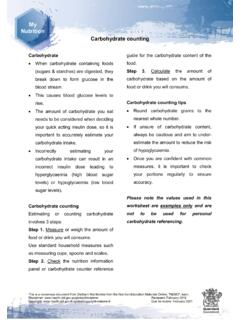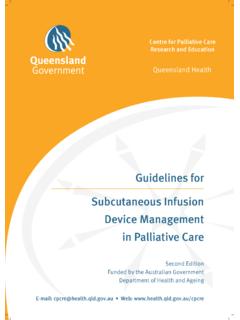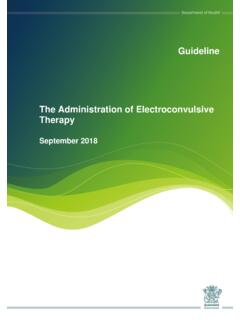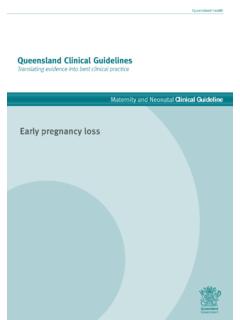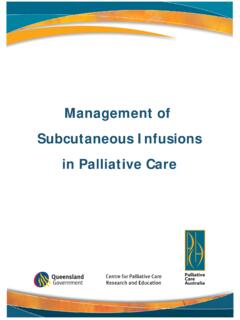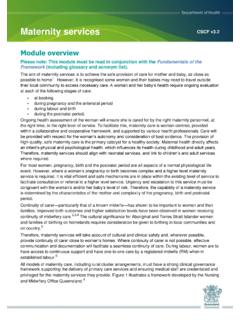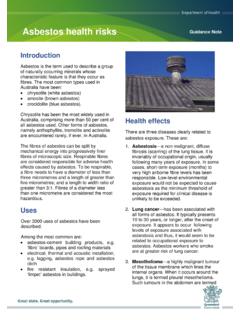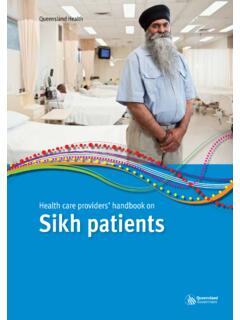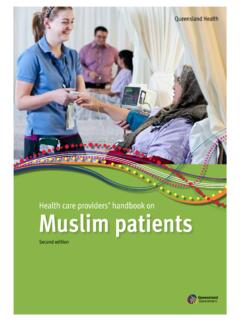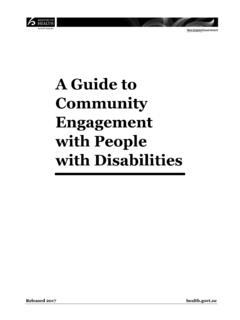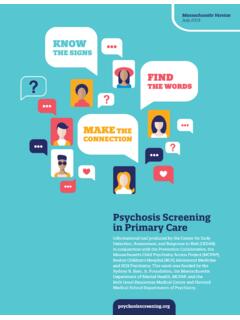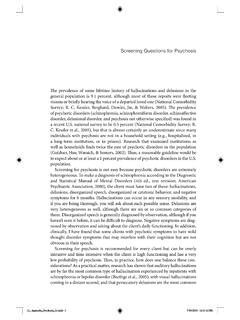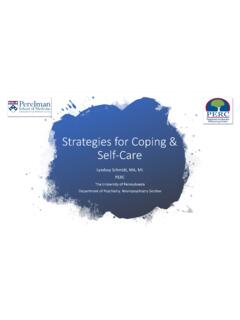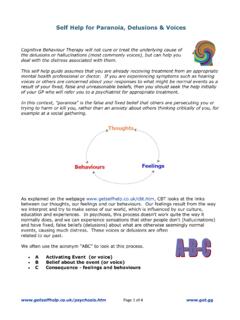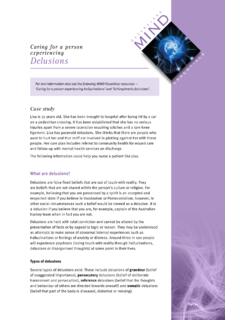Transcription of Caring for a person experiencing mania
1 Page 49 Caring for a person experiencingManiaCase studyYousef is 40. He has been brought to the emergency department with cuts to his arms, chest and face, which he received as a result of a fight in a bar. His friend has advised that Yousef has bipolar disorder, and that he looks like he is on the way up .Staff have concluded that a psychiatric assessment of Yousef is needed to determine whether admission for psychiatric reasons is required. Yousef is to be kept in the emergency department until this can be arranged, which could be several hours.
2 During this time, he finds it extremely difficult to stay in bed and is constantly wandering around the ward into other rooms. When he is in bed, Yousef is constantly ringing the buzzer. He is frequently found talking to other patients, staff and visitors about his wonderful new invention and trying to get them to invest in a company that he is planning to set following information could help you nurse a patient like is mania ? mania is a state of extreme physical and emotional elation. Symptoms and types of mania A person experiencing mania or a manic episode may present with the following symptoms:u Elevated mood.
3 The person feels extremely high , happy and full of energy; he or she may describe the experience as feeling on top of the world and invincible. The person may shif t rapidly from an elevated, happy mood to being angr y and irritable if they perceive they have been Increased energy and overactivity. The person may have great difficulty remaining Reduced need for sleep or food. The person may be too active to eat or Irritability. The person may become angr y and irritated with those who disagree with or dismiss his or her sometimes unrealistic plans or Rapid thinking and speech.
4 The person s thoughts and speech are more rapid than Grandiose plans and beliefs. It is quite common for a person in a hypomanic or manic state to believe that he or she is unusually talented or Page 49 Page 50 Maniagifted or has special friends in power. For example, the person may believe that he or she is on a special mission from Lack of insight. A person in a hypomanic or manic state may understand that other people see his or her ideas and actions as inappropriate, reckless or irrational. However, he or she is unlikely to personally accept that the behaviour is inappropriate, due to a lack of Distractibility.
5 The person has difficulty maintaining attention and may not be able to filter out external that are characterised by the above, but are not associated with marked social or occupational disturbance, a need for hospitalisation or psychotic features are called hypomanic , onset and course of maniaA person may experience mania as a result of a range of factors, including:u stressful eventsu genetic factorsu biochemical factors (neurotransmitter abnormalities or imbalances)u seasonal influencesu bipolar affective disorder (BPAD).
6 For individuals living with bipolar affective disorder (also called bipolar disorder and formerly called manic depressive psychosis ) they will experience recurrent episodes of depression and mania , of which the symptoms are not due to substance use or other general medical conditions. The manic or depressive episodes are usually separated by lengthy periods where the person is average age for the first manic episode is in the early twenties; however, for some, episodes begin in adolescence. The first episode rarely occurs after the age of 50.
7 Manic episodes in adolescence are more likely to include psychotic features and may be associated with school truancy, antisocial behaviour, school failure or substance abuse. Lifetime prevalence is about one per episodes begin suddenly and with a rapid escalation of symptoms over a few days. They may follow psychosocial stressors or a major depressive in diagnosisSymptoms similar to those in a manic phase may be due to the effects of antidepressant medication, electroconvulsive therapy or medication prescribed for other physical illnesses (for example, corticosteroids) and are not included in this diagnostic category.
8 Be aware co-occurring substance use disorders are common and engage in routine screening and 50A person s perspective on what it is like to experience mania I am feeling ten foot tall, bulletproof and experiencing a high I d imagine you could attain only on the strongest drugs. I place my head in my hands and my mood starts morphing from hilarity into a cosmic scramble of visions from history. Craig Hamilton in Broken OpenManiaSome reported reactions to people experiencing maniaNurses who have worked with people who have mania have reported the following reactions:Amusement It is quite common for staff to react to the person s acting out and exuberance with amusement.
9 It is important to ensure that respect for the person is maintained at all times. Irritation A person experiencing mania might not be compliant with hospital routines or personal health care. This can cause nurses to feel irritated or even angry with the person . Embarrassment Some nurses report feeling embarrassed at what they perceive as an apparent lack of control in the person s behaviour. This embarrassment can be particularly acute if this behaviour is conducted in the presence of others, who might expect the nurse to When a person is manic, he or she can sometimes be verbally abusive and make personally demeaning comments.
10 This can cause further distress among staff, who may feel uncomfortable nursing the for nursing a person experiencing maniaAppropriate goals for Caring for a person with mania in a community or hospital setting include: u Develop a relationship with the person based on empathy and Ensure that the person remains free from Assist the person to decrease their agitation and hyperactivity. u Promote an understanding of the features and appropriate management of mania , such as mood regulation strategies or Promote positive health behaviours, including medication compliance and healthy lifestyle choices (for example, diet, exercise, not smoking etc.)
